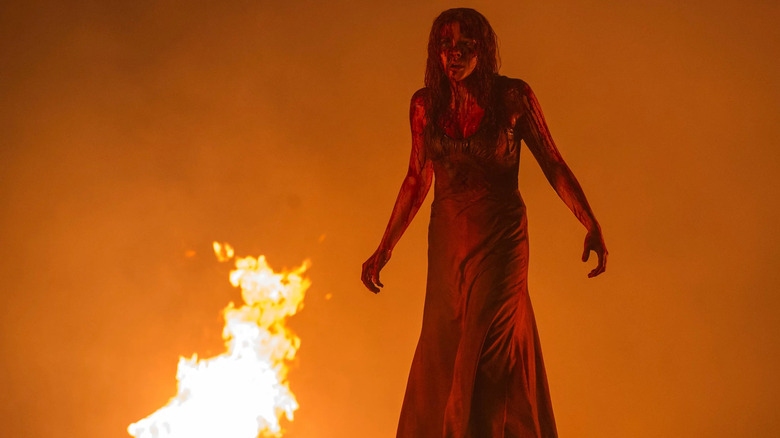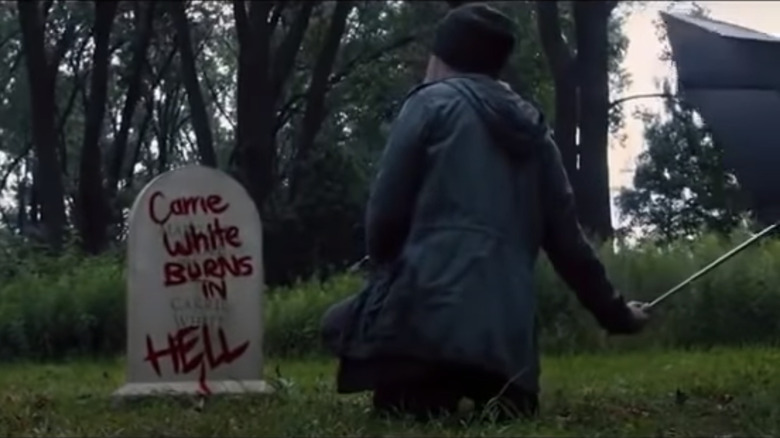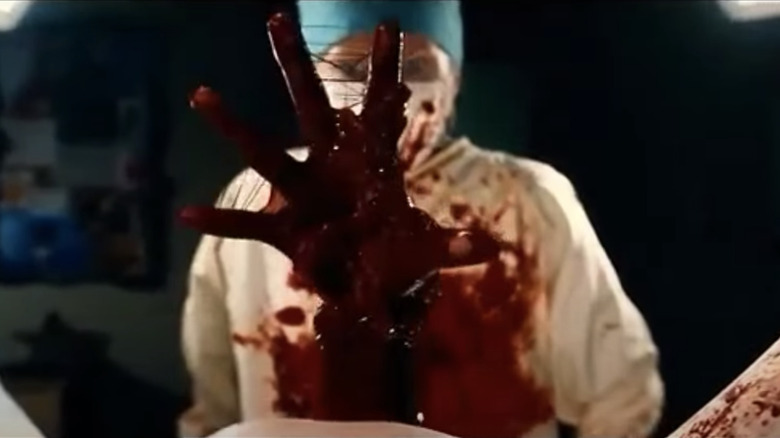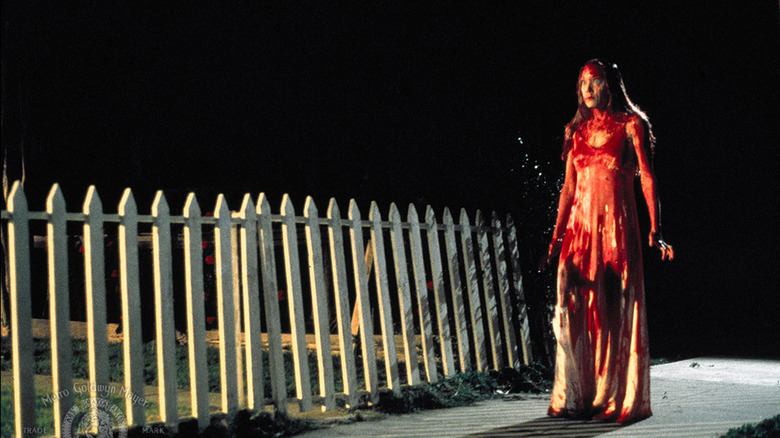The Carrie Alternate Ending Makes For A Very Different Movie
No one is going to claim that the 2013 remake of "Carrie" is the best adaptation of Stephen King's 1974 novel of the same name. That slot is reserved for Brian De Palma's 1978 cinematic adaptation, with Sissy Spacek occupying the role of the eponymous telekinetic teen killer. But the charms of "Boys Don't Cry" director Kimberly Peirce's take on the blood-drenched prom queen can't be totally dismissed. For one, it has an absolutely stacked cast: Chloë Grace Moretz stars as the shy, sheltered Carrie White; Julianne Moore plays her unstable, ultra-religious mother Margaret; character actress supreme Judy Greer plays the sympathetic gym teacher Miss Desjardin.
As a whole, Peirce's film is a fairly loyal remake of De Palma's, with the only major detractions occurring during the film's very first and last few moments. We are introduced to Carrie not in the girl's locker room where she gets her first period, but rather during her birth. Margaret delivers Carrie alone in her bedroom, and at first plans on killing the infant. She quickly changes her mind, though, choosing instead to raise Carrie in a staunchly conservative household as penance for her sexual sins. This is why Carrie later freaks out when she gets her first period — her mother believes female sexuality is repugnant in all its expressions, and as such never informed her daughter of her body's biology. Her mother believes Carrie's menstruation has marked her for the devil, burgeoning telekinetic powers notwithstanding.
But what about the 2013 film's ending? Well, it turns out there are two versions out there. While the theatrical version is creepy in its own right, the alternate ending is a hellish nightmare vision that incorporates and revamps the very best aspects of De Palma's.
Carrie's original ending
Everyone knows how the rest of the story goes: Carrie endures ruthless bullying, religious torment, and is eventually doused in a bucket of pig's blood when the prom queen vote is rigged in her favor. A massacre ensues, Carrie killing her bullies and anyone who stands in her way before burning the entire school down. Unlike in Brian De Palma's version, Miss Desjardin is spared by Carrie instead of being cut in half by a falling basketball hoop. But all Carrie's enemies, including popular girl Chris (Portia Doubleday) and her boyfriend, Billy (Alex Russell), are ruthlessly killed using her paranormal abilities. She then turns her attention to Sue Snell (Gabriella Wilde), one of her former bullies who persuaded her boyfriend, Tommy (Ansel Elgort), to take Carrie to prom in the first place. But when she senses Sue's sincere regret for what happened (along with the fact that Sue is currently pregnant), Carrie spares her as well. When the doomed prom queen arrives back home to wash off the blood — porcine and human — she is confronted by her mother, who stabs her in the back with a knife. Before she can cause more harm to her, Carrie remorsefully sends knives and other sharp objects hurling through the air, stabbing her mother to death. Her own stab wound proves to be fatal, though, and Carrie eventually succumbs to her injuries.
Feeling guilty about Carrie's demise and the cruel prank that set her off, Sue visits her former classmate's grave. It's been vandalized, with bright red graffiti reading "CARRIE WHITE BURNS IN HELL." Sue places a single white rose under the gravestone. As she walks away, the stone begins to crack and Carrie's anguished cry from beyond the grave can be heard.
This is where the story ends in the theatrical version of Peirce's adaptation. If this sounds underwhelming compared to King's paranormal state of emergency or De Palma's final jump scare, all you have to do is seek out the film's alternate ending for a truly chilling last scream.
The chilling alternate ending
After she leaves Carrie's grave, the alternate ending flashes forward to the pregnant Sue's delivery day. In the hospital room about to give birth, she becomes instantly uneasy. "Something doesn't feel right," she says to the attending physician. She's told that everything will be okay and that she needs to focus on pushing. As she does so, it's clear she's in terrible distress, but her worries are dismissed, the doctors intuiting that she's simply unprepared for the reality of a natural delivery. "It hurts! Please help me," Sue cries. As the doctors practically hold her down, it appears she's finally given birth. But instead of a fresh-faced baby emerging from her womb, a blood-coated arm does. It's clear this is Carrie exacting her revenge, bending at the elbow to grab Sue's wrist as she screams in horror.
Then, there's another cut. Sue, still pregnant, shrieks and sobs in her bedroom. "It's okay," her mother says, holding her hysterical daughter. "Wake up, baby! It's over," she pleads. It's clear this is just one of many episodes Sue continues to endure, no doubt a sign of PTSD from the massacre. With Sue still expecting, however, the scene truly evokes terror — is this all just a recurring nightmare, or some sort of prophecy? Will Carrie actually return?
Parallels to Brian De Palma's classic 1978 adaptation
While the 2013 remake's original ending evokes Brian De Palma's conclusion by way of Sue visiting Carrie's grave, it does fall flat without the revelation that even the survivors of Carrie's wrath are irreparably affected by her rampage. As such, the alternate ending offers both a direct allusion to the 1978 film's final fright while adding its own original imagery. At the very end of De Palma's film, Sue visits Carrie's grave — only to have her dead classmate's hand emerge from the ground and grab her arm. Similarly, this encounter is just a nightmare, one Sue's mother desperately tries to awake her from.
While Sue isn't pregnant in the Stephen King novel or De Palma's adaptation, this detail included by screenwriters Lawrence D. Cohen and Roberto Aguirre-Sacasa imbues the film with a uniquely terrifying slant. Carrie's hand still appears to clutch Sue's arm, this time coming from within her own body. This echoes the nightmare sequence in David Cronenberg's "The Fly," where Seth Brundle's (Jeff Goldblum) girlfriend, Ronnie (Geena Davis), envisions giving birth to an enormous maggot.
Particularly when it comes to anxieties of motherhood and child-rearing, it's natural to fear that the ugliest aspects of our own selves might be passed down to our children. The alternate ending of the 2013 remake of "Carrie" is a cautionary one: If we raise our children to be as cruel and uncaring as we are, we will only breed more hurt, misunderstood, and ultimately vengeful children like Carrie. It's a general toss-up as to whether these offspring might develop telekinetic abilities, though.



